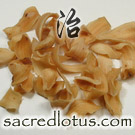Bai He (Lily Bulb)
Herb 1 of 15 in Herbs that Tonify Yin
Buy This Herb
Get free shipping from
our partners at CHD
our partners at CHD
Chinese Herb Actions
-
Moistens the Lung, Stops Cough, and Clear Heat
For Lung Qi and Yin Deficiency causing consumptive cough with symptoms such as consumptive, dry, chronic cough, shortness of breath, and white, yellow, or bloody sputum that is difficult to expectorate. Also for heat signs accompanying Lung Yin Deficiency such as night sweats, tidal fever, and an absence of sputum. - Clears Heat and Calms the Spirit (Shen)
For Lung Yin Deficiency directly affecting the Heart with symptoms such as physical or speech disorientation, trouble with concentration, sensory impairment, bitter taste in the mouth, dark yellow urine, and a rapid thready pulse. - Nourishes the Yin and Harmonizes the Middle Jiao
For dull pain associated with Stomach Yin Deficiency.
Chinese Herb Contraindications & Cautions
- As this herb it is moistening and cold, it should not be used in patients with Middle Jiao Deficiency, diarrhea, or loose stools.
- Do not use in cases of Wind-Cold or Phlegm cough.
- Bai He may also cause sedation and drowsiness, and may impair a person's ability to drive and operate machinery.
Herb-Drug Interactions
- Section not completed...
Chinese Herb Toxicity & Overdose
- Section not completed...
Chinese Herb Dosage
- 10-30 grams
Chinese Herb Notes
- This herb is often used as a food.
Chinese Herb Combinations:
- Bai He (Bulbus Lilii)
- Zhi Mu (Rhizoma Anemarrhenae Aspheloidis)
Combined Actions:Combined Indications:
- Nourish Yin and Clear Heat
Preparation:
- Mental agitation, insomnia, vertigo
- Dry cough
- Honey fry Bai He for dry cough and use raw Bai He for agitation and insomnia.
This Herb Appears in the Following Formulas:
- Bai He Gu Jin Tang (Lily Bulb Decoction to Preserve the Metal)
Category: Formulas that Enrich the Yin and Moisten Dryness






